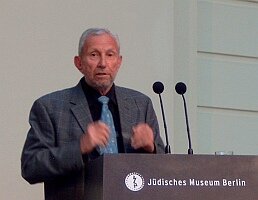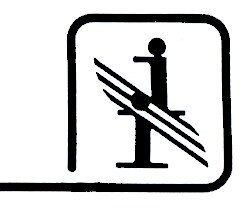Margins, Borders, and Peripheries in Modern European-Jewish Literature
Monday September 5th - Wednesday September 7th, 2011
An International Conference
This conference will focus on European-Jewish Literatures emerging from countries and linguistic regions on the Eastern, Western, Northern, or Southern margins of Europe. On a more theoretical level, it will also discuss issues such as the canon, authority, and hierarchy as well as the status of minorities, outsiders, and the potential of literature to challenge approaches, discourses, and perspectives privileging the center and the mainstream. The conference is organized in the context of the 10th anniversary of the Institute of Jewish Studies at the University of Antwerp and the 'European Day of Jewish Heritage,' in cooperation with the Institute of Jewish Studies at the University of Basel (CH) and the Association for European-Jewish Literature Studies (AEJLS).
Deze conferentie richt zich op Europees-Joodse literaturen afkomstig uit landen en taalgebieden aan de Oostelijke, Westelijke, Noordelijke of Zuidelijke marges van Europa. Op een meer theoretisch niveau zullen daarbij kwesties als de canon, authoriteit en hiërarchie, de status van minderheden en buitenstaanders aan bod komen, alsook het potentieel van literatuur om methodes, redeneringen en perspectieven gericht op het centrum en de mainstream in vraag te stellen. De conferentie wordt georganiseerd binnen de context van het 10-jarige jubileum van het instituut voor Joodse Studies aan de Universiteit Antwerpen en van de 'Europese Dag van het Joods Cultureel Erfgoed,' in samenwerking met het Instituut voor Joodse Studies aan de Universiteit van Basel (CH) en de Association for European-Jewish Literature Studies (AEJLS).
Organization
Institute of Jewish Studies, University of Antwerp (B)
Institute of Jewish Studies, University of Basel (CH)
Association for European-Jewish Literature Studies (AEJLS)
Confirmed Speakers
- Prof. Dr. Steven E. Aschheim (Hebrew University of Jerusalem - opening lecture)
- Prof. Dr. Shlomo Berger (Universiteit van Amsterdam)
- Prof. Dr. Stephan Braese (RWTH Aachen)
- PD Dr. Barbara Breysach (University of Warmia and Mazury in Olsztyn)
- Dr. Manuela Cimeli (Universität Basel)
- Prof. Dr. Armin Eidherr (Universität Salzburg)
- Prof. Dr. Amir Eshel (Stanford University)
- Prof. Dr. Kathleen Gyssels (Universiteit Antwerpen)
- Prof. Dr. Naama Rokem (University of Chicago)
- Prof. Dr. Galili Shahar (Tel Aviv University)
- Prof. Dr. Peter Varga (Eotvos Lorand University of Budapest)
- Prof. Dr. Gabriele von Glasenapp (Universität zu Köln)
- Prof. Dr. Yfaat Weiss (Hebrew University of Jerusalem)
- Prof. Dr. Bernd Witte (Heinrich-Heine-Universität Düsseldorf)
Keynote Speaker
Prof. Dr. Steven E. Aschheim (Hebrew University of Jerusalem)
"Icons at the Border: The German-Jewish Legacy in the 21st Century"

Internationale Conferentie Ancient Jewish Texts and the 'Literary'
March 14yh-15th, 2012
Ancient Jewish Texts and the 'Literary'
Universiteit Antwerpen - Hof van Liere (Prinsstraat 13, 2000 Antwerpen)
This conference explores the literary dimension of ancient Jewish texts, gathering scholars from different academic fields (rabbinic studies, biblical studies, literary studies, and philosophy) and drawing on different methodologies (literary criticism, rhetorical criticism, cognitive linguistics, historical criticism, and reception history) in order to establish the state of the art in the field of ancient Jewish text studies. Participants will discuss the relevance, accuracy, potential and possible alternatives to the literary approach developed in the 1980s and predominant ever since in addressing textual features.
Since the breakthrough of the work of comparative literary theorists in biblical studies in the early 80s of the previous century, ancient Jewish texts have been analyzed in terms of aspects regarded as literary in a modern understanding of this term. However, this approach is controversial since it applies a modern framework to ancient texts, assuming that similar features must fulfill similar roles. Moreover, the literary approach was not as eagerly adopted in the study of other ancient Jewish texts, such as piyutim, Dead Sea Scrolls, and early rabbinic writings. The speakers will present and discuss various modes of addressing literary features in a variety of older Jewish texts. These modes will emphasize challenges to the established “modern” literary understanding of these texts and will include a multitude of approaches: a strong theological or liturgical thrust, cognitive or didactic perspectives, as well as hybrid readings in which these features have multiple purposes. To more theoretically oriented research within the field of Jewish studies, it is of particular interest to evaluate the literary dimension of the corpus of ancient texts. Finally, the conference aims at assessing the role and contribution of the various methods to the different fields represented at the conference and to formulate directions for future research.
Confirmed keynote speakers:
- Prof. dr. Scott Noegel, University of Washington (United States of America)
- Prof. dr. Ellen Van Wolde, Radboud Universiteit Nijmegen (Netherlands)
- Prof. dr. Wilfred Watson, Newcastle University (United Kingdom)
- Prof. dr. Robert Gordon, Cambridge University (United Kingdom)
Conference Program and Keynote Abstracts (PDF)
Call for papers:
Ancient Jewish Texts and the 'Literary'
14-15 March 2012
Institute of Jewish Studies (University of Antwerp)
Since the 60s and 70s of the previous century the form and exact wording of ancient Jewish texts has been the focus of attention of a literary approach within biblical/Jewish studies. This subfield relies on the insights of narratology on the one hand and rhetoric on the other. Resulting from this approach any research involving the creative use of language, e.g. in the Hebrew Bible, is considered literary.
In recent years this term has increasingly been questioned as being a presupposition rather than the result of research. ‘Literary’ therefore should be understood as the common though not necessarily apt umbrella term for all studies focusing on the form of ancient texts. Contributors are encouraged to interpret the term either in defense of literariness or against it.
We invite participants from all related fields: Jewish studies, biblical studies, ancient Near Eastern studies, classical studies, literary studies, and stylistics. Possible approaches include among others analyses of the Hebrew Bible, its old translations, early commentaries and retellings, as long as they can be considered ancient (i.e., pre-medieval) and Jewish (i.e., written by Jews or in a Jewish setting).
Proposals up to 300 words can be submitted no later than July 31, 2011, to Karolien Vermeulen (karolien.vermeulen@uantwerpen.be or karolien.vermeulen@ugent.be).
5th Contact Day Jewish Studies on the Low Countries
Dinsdag 22 mei 2012
Universiteit Antwerpen, stadscampus, lokaal C.102 (hoek Vekestraat en Grote Kauwenberg, 2000 Antwerpen)
In samenwerking met het Departement Geschiedenis van de Universiteit Antwerpen
Het Instituut voor Joodse Studies organiseert voor de vijfde keer aan de Universiteit Antwerpen een interdisciplinaire ontmoetingsstudiedag op het terrein van Joodse Studies over de Lage Landen. Doel van deze dag is de verschillende onderzoekers die zich bezighouden met Joodse Studies over de Lage Landen met elkaar in contact te brengen.
Program
09.00-09.15 Coffee and tea
09.15-09.30 Welcome and opening by Vivian Liska, Karin Hofmeester and Veerle Vanden Daelen
09.30-10.30 Session I: (Colonial) State Control, Nationality and Jewish Identity
Chair: Bart Wallet (University of Amsterdam)
Jessica Roitman (KITLV/Royal Netherlands Institute of Southeast Asian and Caribbean Studies), Creating Confusion in the Colonies: Negotiating Nationality across Imperial Boundaries
Tsila Rädecker (University of Groningen), Moral Hygiene and Jewish Religious Practice in the Nineteenth-Century Netherlands
10.30-11.30 Session II: Jewish Women's Identity
Chair: Chia Longman (Ghent University)
Judith van der Wel (University of Groningen), Three Generations Dutch Women and their (Religious) Jewish Identities
Efrat Tzadik (KULeuven), Jewish Women in the Belgian Working Place - An Anthropological View
11.30-11.45 Coffee break
11.45-13.15 Session III: Jewish Diamond Workers and Migration
Chair: Veerle Vanden Daelen (Ceges-Soma / University of Antwerp)
Youssef Deconinck (University of Antwerp), Migration of Amsterdam Jewish Diamond Workers and Traders to Antwerp 1865-1880
Huibert Schijf (University of Amsterdam) & Peter Tammes (Independent Researcher), Trade Union Membership of Jewish Diamond Workers, 1898-1914: Integration, Discipline, and Migration
Peter Tammes (Independent Researcher) & Karin Hofmeester (IISG / University of Antwerp), Eastern European Jewish Immigrants in Amsterdam 1880-1914: Immigrant Aid, Responses in the Jewish Press and Settlement Patterns
13.15-14.15 Lunch
14.15-15.15 Session IV: Transnational Migration: Antwerp as a Transit City in Jewish Migration
Chair: Evelien Gans (NIOD Institute for War, Holocaust and Genocide Studies)
Bram Beelaert & Mandy Nauwelaerts (Red Star Line Museum), The Jewish Emigrant Experience: Voices and Stories from the Red Star Line Museum
Lien Vloeberghs (Ghent University), Ezra, an Antwerp Jewish Aid Organization for Jewish Transit Migrants, 1918-1940
15.15-16.15 Session V: The Perspecution of Jews during the Second World War and its Consequences
Chair: Laura Hobson Faure (Université Sorbonne Nouvelle, Paris 3)
Antoine Burgard (Université Lyon II), For a Comparative History of Holocaust Orphans Rescue Projects: the Work of the AIVG (Aide aux Israélites Victimes de la Guerre) in Belgium and of the OSE (Oeuvre de Secours aux Enfants) in France
Casper van der Veen (Utrecht University), Sally Dormits (1909 - 1942) and the 'Nederlandse Volksmilitie' (NVM): A Jewish Communist Resistance Group in Rotterdam
16.15-16.30 Coffee break
16.30-17.30 Session VI: Jewish Archives on the Low Countries
Chair: Karin Hofmeester (IISG / University of Antwerp)
Gertjan Desmet & Pascale Falek-Alhadeff (Belgian State Archives), Archival Source Guide on Judaism and the Jewish Community in Belgium, 19th-20th Century. Preliminary findings
Veerle Vanden Daelen (Ceges-Soma / University of Antwerp), European Holocaust Research Infrastructure (EHRI): Connecting Collections, Collection-holding Institutions and Researchers
17.30-17.45 Closing remarks (Karin Hofmeester & Veerle Vanden Daelen)
Internationale Workshop Law, Sacrifice and Morality: A Comparative View
May 15th
Universiteit Antwerpen, Hof van Liere
organized by the Institute of Jewish Studies and Centre for Law and Cosmopolitan Values (University of Antwerp).
with the support of Institutum Iudaicum
Concept:
The idea of self-transcendence, or of leaving aside one’s own self-interest and adopting the point of view of the other, is a central theme in moral philosophy and religious studies. Sacrifice, moreover, is an essential phenomenon for legal and political life. This workshop addresses the role that sacrifice plays in a political and legal order, with particular emphasis on the establishment and preservation of constitutional law. This question will be approached from the perspective of legal, political and religious studies.
The workshop raises the following questions: First, does a political and legal order need to be grounded on a sacrificial logic? The second question, arising from contemporary pluralism, considers how a given political order copes with moral conflicts arising from the performance of sacrifice. The third question considers how different monotheistic religions deal with the phenomenon of sacrifice and the extent to which they recognize a sacrificial logic. Finally, we ask how it can be prevented that sacrifice turns into a practice of idolatry, or, conversely, into a political order completely devoid of any sacrificial aspect (as the European Union has sometimes been described).
This workshop marks the beginning of a cooperation between the Institute of Jewish Studies and the Centre for Law and Cosmopolitan Values as pertains to the common research endeavor on the topic of ‘Law and Religion’.
Speakers and Respondents:
- Prof. Moshe Halbertal (Keynote)
- Prof. Paul Kahn
- Prof. Johan van der Walt
- Prof. Wolfgang Palaver
- Prof. Luc Anckaert
- Dr. Paula Schwebel
- Prof. Arthur Cools
- Prof. Vivian Liska
- Dr. Marco Goldoni